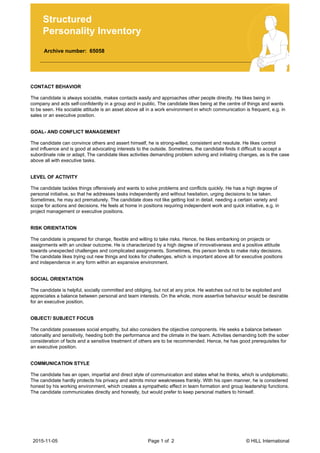Contenu connexe
Similaire à evaluation_text components
Similaire à evaluation_text components (20)
evaluation_text components
- 1. Structured
Personality Inventory
Archive number: 65058
2015-11-05 Page 1 of 2 © HILL International
CONTACT BEHAVIOR
The candidate is always sociable, makes contacts easily and approaches other people directly. He likes being in
company and acts self-confidently in a group and in public. The candidate likes being at the centre of things and wants
to be seen. His sociable attitude is an asset above all in a work environment in which communication is frequent, e.g. in
sales or an executive position.
GOAL- AND CONFLICT MANAGEMENT
The candidate can convince others and assert himself, he is strong-willed, consistent and resolute. He likes control
and influence and is good at advocating interests to the outside. Sometimes, the candidate finds it difficult to accept a
subordinate role or adapt. The candidate likes activities demanding problem solving and initiating changes, as is the case
above all with executive tasks.
LEVEL OF ACTIVITY
The candidate tackles things offensively and wants to solve problems and conflicts quickly. He has a high degree of
personal initiative, so that he addresses tasks independently and without hesitation, urging decisions to be taken.
Sometimes, he may act prematurely. The candidate does not like getting lost in detail, needing a certain variety and
scope for actions and decisions. He feels at home in positions requiring independent work and quick initiative, e.g. in
project management or executive positions.
RISK ORIENTATION
The candidate is prepared for change, flexible and willing to take risks. Hence, he likes embarking on projects or
assignments with an unclear outcome. He is characterized by a high degree of innovativeness and a positive attitude
towards unexpected challenges and complicated assignments. Sometimes, this person tends to make risky decisions.
The candidate likes trying out new things and looks for challenges, which is important above all for executive positions
and independence in any form within an expansive environment.
SOCIAL ORIENTATION
The candidate is helpful, socially committed and obliging, but not at any price. He watches out not to be exploited and
appreciates a balance between personal and team interests. On the whole, more assertive behaviour would be desirable
for an executive position.
OBJECT/ SUBJECT FOCUS
The candidate possesses social empathy, but also considers the objective components. He seeks a balance between
rationality and sensitivity, heeding both the performance and the climate in the team. Activities demanding both the sober
consideration of facts and a sensitive treatment of others are to be recommended. Hence, he has good prerequisites for
an executive position.
COMMUNICATION STYLE
The candidate has an open, impartial and direct style of communication and states what he thinks, which is undiplomatic.
The candidate hardly protects his privacy and admits minor weaknesses frankly. With his open manner, he is considered
honest by his working environment, which creates a sympathetic effect in team formation and group leadership functions.
The candidate communicates directly and honestly, but would prefer to keep personal matters to himself.
- 2. Structured
Personality Inventory
Archive number: 65058
2015-11-05 Page 2 of 2 © HILL International
EXPECTATION ATTITUDE
In principle, the candidate evinces a cautious attitude. He does not like relying on others, preferring to check everything.
He does not like taking suggestions by others into account, and help by others is not generally accepted. Fear of (new)
disappointments makes the candidate suspicious of what others say. His sceptical and questioning manner helps him to
act with presence of mind even in critical situations, which constitutes a crucial trait for control assignments and activities
demanding presence of mind.
TENDENCY OF MOOD
The candidate describes himself as emotionally robust, resilient and inwardly balanced. He is unflappable and in a
position to control his feelings and not get carried away. He tends to come to terms with disappointments quickly, bears
pressure easily and copes with personal problems alone. The candidate is resistant to disturbances at work. He accepts
criticism in a neutral way. Due to his stable character and high tolerance of frustration, he can particularly benefit from
activities involving great psychological pressure, so he has good prerequisites for executive positions.
SELF-ESTIMATION
The candidate highly estimates his own performance and faces new challenges with confidence. He can present himself
well, and his manner seems independent and sovereign. Sometimes, he is not receptive to criticism and possibly seems
arrogant and non-reflective with the danger of self-overestimation. His self-confidence is important for representational
tasks and forms a main feature of charismatic personalities that can often be found in executive positions.
TENSION LEVEL
The candidate shows an average degree of inner tension. Basically, he is relaxed, but sometimes tense in the case of
challenging or stressful events. In general, a low degree of inner tension is desirable in executive positions. In the public
sphere, he can switch off and remain calm more easily than in contacts to friends and colleagues.
SELF REGULARISATION
The candidate prefers a conscientious and systematic manner of work. He attaches importance to a regulated and
structured daily routine, paying attention to correct behaviour, both by himself and others. He is reliable, tidy and
responsible, being guided by generally accepted norms and values. At work, he reliably sticks to the rules, doing his
duty in disciplined fashion even in difficult situations and without letting himself be carried away to do rash actions.
With his organized and precise manner, the candidate is good particularly in highly regulated and structured working
environments and also suitable for executive functions.
